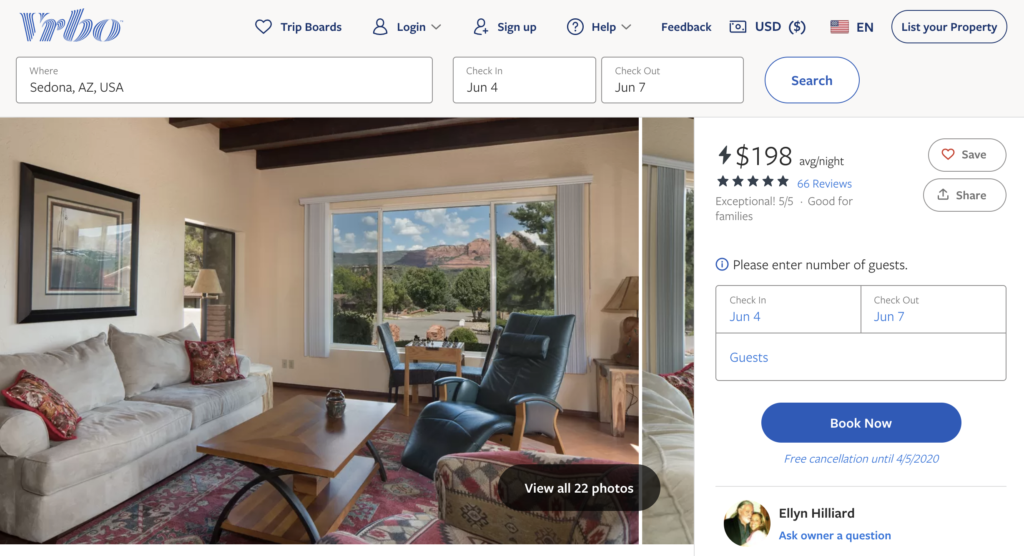Up until a couple of weeks ago, life was going great for Ellyn Hilliard, a 62-year-old schoolteacher and short-term rental host in Sedona, Arizona.
With her 70-year-old husband retired, Ellyn’s teacher salary covered their necessary expenses. Income from their two short-term rentals allowed them to build a retirement nest egg and have some extras, like visiting their children in Colorado and Texas.
Then COVID-19 upended their world.
Ellyn received 17 cancellations in three days for one of her short-term rental properties after one booking platform announced would automatically offer full refunds for all reservations through April 15. Some guests canceled well into June.
Her other property, which is listed on Vrbo, is faring better. The company offered to help Ellyn and her guests find ways to negotiate cancellations and refunds. Many of her guests rebooked or received credits to use for a future stay in the two-bedroom Spanish cottage.

The STR Economic Ecosystem
Still, with the onslaught of pandemic-related cancellations, she suddenly had no income coming in from that house, creating an unexpected financial burden.
“How are you going to pay the mortgage? How are you going to pay the utilities?” Ellyn asked. “I had to call my gardener. He was so sad. I had to call my cleaning lady — she is panicking. It was really hard.”
When a short-term rental host suffers economically, it affects a lot of other people, from handymen to pool technicians to plumbers, she said.
“We put money into furniture, repairs. I can’t tell you how much I have spent at Ace Hardware. We give recommendations about restaurants to go to and Jeep tours and hot air balloons. We’re really part of the whole tourist economy here. I don’t think most people realize that. So when we close down, it’s not just the hosting site that loses money. It’s all these other businesses too.”
While Ellyn believes her Vrbo property can hang on through the crisis, she decided to cut her losses and put her other property up for sale immediately — although she’s aware that she may not get a buyer anytime soon.
Uncertain Future for each short-term rental host

If a buyer doesn’t come along, she may have to take out a small loan to get her through the crisis. Unfortunately, no one knows when that will be, and she knows that she is not the only short-term rental host facing these tough choices.
As a short-term rental host, Ellyn hopes this crisis in the hospitality industry will spur a reconsideration of proposed legislation targeting short-term rentals, including a bill currently in the state legislature to allow local governments to create more rules and another to force short-term rental owners to pay property taxes at commercial rates.
These kinds of measures could put short-term rental owners in even more of a financial bind than they are now, she said. She also thinks that problems such as “party houses” can be solved through enforcement of existing laws.
For her part, Ellyn is careful to take measures to prevent problems at her properties such as excessive noise. She limits occupancy, has installed a noise meter outside on the deck that notifies her if noise levels get too loud, and uses a video doorbell to make sure her guests have represented themselves accurately. And she lives near her properties and has open relationships with the neighbors, who know they can turn to her in case of any issues.
She believes every short-term rental host is similarly responsible, although right now, survival is the bigger question on everyone’s minds.
“A lot of people are worried about what’s going to happen. But we’ll just have to wait and see.”
Read our latest stories!
- May 2024 Partner Update
- Recap: Better Stays Together – Southeast Virtual Meetup
- Sue Jones: The Pioneer Behind HR4VR
- April 2024 Newsletter
- April 2024 Partner Update
SUBSCRIBE TO GET UPDATES



